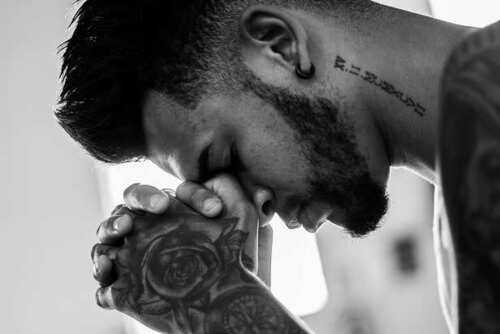
There’s a quiet war being waged against men who dare to be vulnerable. And, no, it’s not happening on the battlefield of some imaginary “man card” review board, but in the less-glamorous corners of society’s expectations. Picture this: you’re a guy, letting your guard down for just a second, sharing your fears, your feelings, your human side, and before you even finish the sentence, the world’s already looking at you like you’ve grown an extra head. So, what's going on? Why does society give us the side-eye when men show their humanity? Well, strap in, because we’re about to unpack that.
1. The Man Up Mentality

Boys are taught emotional suppression through outdated “man up” mentality.
First off, let’s acknowledge the obvious. From the moment little boys start talking, they’re hit with the mantra: “Boys don’t cry,” “Man up,” “Walk it off.” It's practically in the water, like a cultural contagion you can’t escape. Sure, this generation of dads might be a little more woke, but there’s still a deep, subtle undertow telling men that showing emotion is a one-way ticket to loser-ville. The problem? This outdated “man up” mentality has been passed down like a bad sweater at Christmas. It’s not just that it’s wrong—it’s that it does more damage than a broken heart in a romcom plot.
Men are conditioned to hide their vulnerabilities, not because they don’t have them, but because society’s response is like a collective “Ugh, not now, buddy.” Crying is for the weak, or so the story goes. Sharing feelings? That’s what the womenfolk do, right? But let’s be real: the more men bottle it up, the more they become ticking emotional time bombs—one bad day away from a breakdown.
2. Vulnerability as Weakness

Vulnerability is courage, not weakness; emotional openness is strength.
Now, here’s where things get deliciously complicated. Vulnerability doesn’t
actually make a person weak, but society’s interpretation of vulnerability as weakness? Oh, that’s a whole other monster. Show emotion, and suddenly you’re branded a “sensitive” guy—like it’s some sort of crime. A “nice guy,” maybe. Or worse:
the nice guy. You know, the kind who’s always getting friend-zoned or laughed at for wearing his heart on his sleeve. But what if I told you that the guys who wear their hearts on their sleeves are actually the brave ones?
Because here’s the kicker: it takes far more courage to show vulnerability than to pretend to be some stoic, emotionally-constipated statue. Men who dare to admit they’re struggling aren’t “weak” or “soft”; they’re the trailblazers in a world where emotional intelligence is still treated like an avant-garde art piece.
3. The Silent Pressure of Masculinity

Masculinity pressures men to suppress emotions, causing harm.
Masculinity, the unspoken contract that defines how men should behave, talk, walk, and even feel. You know, that little thing we all live by, where men have to be tough, assertive, unemotional, and pretty much a living, breathing Spartan. It’s like this ever-present, invisible force that keeps nudging men to suppress themselves in the name of strength. It’s suffocating. The truth is, this silent pressure is leading to some not-so-silent consequences.
Men who don't know how to express their feelings or deal with their emotions often turn to outlets that aren't exactly healthy. Anger. Addiction. Silence. It's like they’re told to bottle it all up until something explodes. And guess what? It explodes. It might not be a dramatic movie scene, but it’s just as messy. But vulnerability isn’t about crumbling into a pile of mush—it’s about allowing yourself the freedom to admit you’re human. To be open about your struggles, your heartbreaks, and your wins. To say, “Hey, I need help,” without fearing you’ll lose your dignity or your place in society’s (pretty arbitrary) hierarchy of masculinity.
4. The Unseen Costs

Mental health struggles are ignored, leading to higher depression rates.
Okay, let’s talk stats. Men are more likely to die by suicide than women. They’re more prone to untreated mental health issues because they’re trained to shove everything in the emotional attic and lock the door. So when a man does show vulnerability, what happens? Sometimes, nothing. But more often than not, he’s labeled “too emotional,” or “too soft.” And for what? To maintain some imaginary status quo?
The costs are
real. Men’s mental health has been a punchline for far too long. It's brushed under the rug in favor of jokes about “tough guys” and “alpha males,” while the real emotional struggles are dismissed as “just a phase” or “not that big of a deal.” Yet here we are, living in a society where women are encouraged to express themselves, while men are left silently battling their demons behind closed doors. Why is it that being “tough” somehow means being silent and stoic, even when your mental health is struggling?
5. Breaking the Cycle

Encourage vulnerability; challenge stereotypes, and embrace emotional expression.
It’s time to rethink this whole masculinity narrative. And it’s not just a “nice to have” change. It’s a necessary one. Imagine if we lived in a world where showing vulnerability was a strength, not a flaw. Where men could express their emotions without worrying about being ridiculed. Where saying “I’m not okay” didn’t automatically mean you’d be written off as less of a man. The change begins in small moments, when a guy admits he’s struggling or when someone gives him the space to say, “Hey, I’m not doing great today.”
It starts with questioning the outdated stereotypes we cling to, and it grows when society gets comfortable with the idea that men—
people, really—are allowed to have feelings. They’re allowed to break down. And that, my friend, is the real strength. So, if you’re a guy reading this, remember: showing vulnerability doesn’t make you any less of a man—it makes you more of one. And if you’re someone else, maybe it’s time we all start giving men a little more room to breathe, to feel, and to be real. Because, in case we’ve forgotten, it’s 2025, and nobody should have to hide who they are for fear of judgment. Vulnerability is the ultimate act of bravery. Let’s treat it like one.
 There’s a quiet war being waged against men who dare to be vulnerable. And, no, it’s not happening on the battlefield of some imaginary “man card” review board, but in the less-glamorous corners of society’s expectations. Picture this: you’re a guy, letting your guard down for just a second, sharing your fears, your feelings, your human side, and before you even finish the sentence, the world’s already looking at you like you’ve grown an extra head. So, what's going on? Why does society give us the side-eye when men show their humanity? Well, strap in, because we’re about to unpack that.
There’s a quiet war being waged against men who dare to be vulnerable. And, no, it’s not happening on the battlefield of some imaginary “man card” review board, but in the less-glamorous corners of society’s expectations. Picture this: you’re a guy, letting your guard down for just a second, sharing your fears, your feelings, your human side, and before you even finish the sentence, the world’s already looking at you like you’ve grown an extra head. So, what's going on? Why does society give us the side-eye when men show their humanity? Well, strap in, because we’re about to unpack that.




